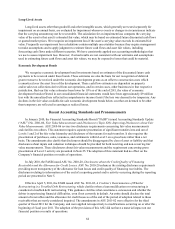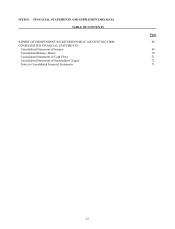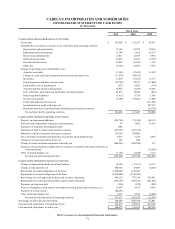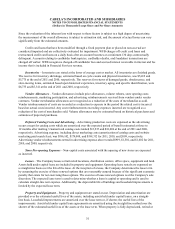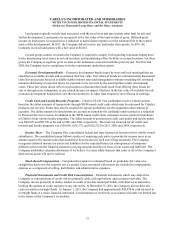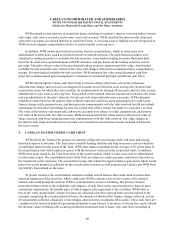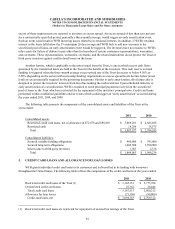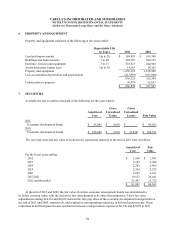Cabela's 2011 Annual Report Download - page 84
Download and view the complete annual report
Please find page 84 of the 2011 Cabela's annual report below. You can navigate through the pages in the report by either clicking on the pages listed below, or by using the keyword search tool below to find specific information within the annual report.74
CABELA’S INCORPORATED AND SUBSIDIARIES
NOTES TO CONSOLIDATED FINANCIAL STATEMENTS
(Dollars in Thousands Except Share and Per Share Amounts)
Financial Services revenue includes credit card interest and fees relating to late payments, payments made
with a customer service representative, payment assurance, foreign currency transactions, and cash advance
transactions. Interest and fees are accrued in accordance with the terms of the applicable cardholder agreements
on credit card loans until the date of charge-off unless placed on non-accrual and fixed payment plans. Interchange
income is earned when a charge is made to a customer’s account.
Cost of Revenue and Selling, Distribution, and Administrative Expenses – The Company’s cost of
revenue primarily consists of merchandise acquisition costs, including freight-in costs, as well as shipping costs.
The Company’s selling, distribution, and administrative expenses consist of the costs associated with selling,
marketing, warehousing, retail store replenishment, and other operating expense activities. All depreciation and
amortization expense is associated with selling, distribution, and administrative activities, and accordingly, is
included in this same category on the consolidated statement of operations.
Cash and Cash Equivalents – Cash equivalents include credit card and debit card receivables from other
banks, which settle within one to four business days. Receivables from other banks totaled $10,677 and $5,521
at the end of 2011 and 2010, respectively. Unpresented checks, net of available cash bank balances, are classified
as current liabilities. Cash and cash equivalents of WFB were $117,035 and $81,904 at the end of 2011 and 2010,
respectively. Due to regulatory restrictions on WFB, the Company is restricted from using cash held by WFB for
non-banking operations.
Credit Card Loans – Credit card loans are reported at their principal amounts outstanding less the allowance
for loan losses. As part of collection efforts, a credit card loan may be closed and placed on non-accrual or
restructured in a fixed payment plan prior to charge off. WFB’s fixed payment plans consist of a lower interest
rate, reduced minimum payment, and elimination of fees. Loans on fixed payment plans include loans in which the
customer has engaged a consumer credit counseling agency to assist them in managing their debt. Customers who
miss two consecutive payments once placed on a payment plan or on non-accrual will resume accruing interest at
the rate they had accrued at before they were placed on a plan. Payments received on non-accrual loans are applied
to principal. WFB does not record any liabilities for off-balance sheet risk of unfunded commitments through the
origination of unsecured credit card loans.
The direct credit card account origination costs associated with costs of successful credit card originations
incurred in transactions with independent third parties, and certain other costs incurred in connection with credit
card approvals, are deferred in other current assets and are amortized on a straight-line basis over 12 months. Other
account solicitation costs, including printing, list processing costs, telemarketing and postage, are expensed as
solicitation occurs.
Allowance for Loan Losses – The allowance for loan losses represents management’s estimate of probable
losses inherent in the credit card loan portfolio. The allowance for loan losses is established through a charge
to the provision for loan losses and is regularly evaluated by management for adequacy. Loans on a payment
plan or non-accrual are segmented from the rest of the credit card loan portfolio into a restructured credit card
loan segment before establishing an allowance for loan losses as these loans have a higher probability of loss.
Management estimates losses inherent in the credit card loans segment and restructured credit card loans segment
based on a model which tracks historical loss experience on delinquent accounts, bankruptcies, death, and charge-
offs, net of estimated recoveries. WFB uses a migration analysis and historical bankruptcy and death rates to
estimate the likelihood that a credit card loan will progress through the various stages of delinquency to charge-
off. This analysis estimates the gross amount of principal that will be charged off over the next 12 months, net of
recoveries. This estimate is used to derive an estimated allowance for loan losses. In addition to these methods of
measurement, management also considers other factors such as general economic and business conditions affecting
key lending areas, credit concentration, changes in origination and portfolio management, and credit quality trends.


